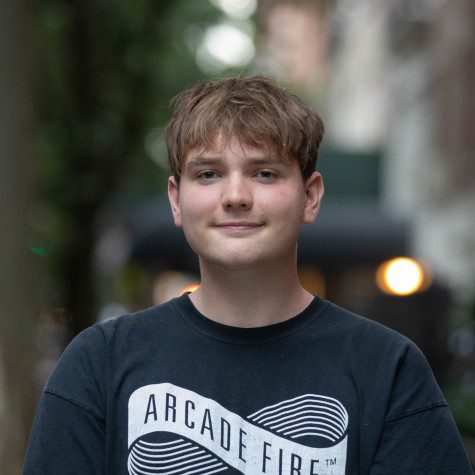The Soapbox: The fight against sexual abuse continues
The Soapbox is a weekly column by WSN’s news desk examining the major developments in world news and rounding up the stories we think are worth the read this week. Global consciousness for a global university.
The Soapbox is a weekly news column rounding up stories worth reading for a global university. (Staff Illustration by Susan Behrends Valenzuela)
February 11, 2022
In the Catholic Church, religious leaders cover up abuse
Former Pope Benedict XVI denied allegations of misconduct on Tuesday regarding the mishandling of sexual abuse cases involving minors. He asked for forgiveness instead. The pope did admit that abuse and wrongdoings took place.
“I have had great responsibilities in the Catholic Church,” Benedict said. “All the greater is my pain for the abuses and the errors that occurred in those different places during the time of my mandate.”
The allegations originated from an investigation into sexual abuse cases among the German clergy, which reported that the former Pope mishandled four cases of abuse during his five years as archbishop. All four instances involved convicted abusers continuing to work in the church following their trials.
The Pope’s statement resulted in harsh criticism from groups representing church abuse survivors, including Eckiger Tisch and the Survivors Network of Those Abused by Priests. Mitchell Garabedian, a lawyer representing victims of the Boston clergy’s sexual abuse cases, joined the survivor groups in denouncing the Pope’s statement.
“He’s a leader setting a poor example morally, and in the process he is encouraging further cover-up of clergy sexual abuse,” Garabedian said.
In Portugal, an independent committee documented 214 sexual abuse allegations against the Portuguese Catholic Church on Feb. 10 since the committee’s creation in early January. In 2020, the Portuguese Church admitted to a dozen allegations. More than half were dropped after the church claimed there was a lack of evidence.
The Independent Committee for the Study of Child Abuse in the Church was formed following an investigation in October that found more that 216,000 children were sexually abused by French Catholic priests since 1950.
“This suffering is associated with feelings of shame, fear, guilt and self-exclusion, reinforcing the idea of lives where the sensation of ‘standing on the sidelines’ was always present,” the committee wrote in a statement.
Internationally, world leaders contest abuse allegations
Australian Prime Minister Scott Morrison, among other government officials, apologized on Tuesday for sexual harassment and abuse of his political staff. Part of the apology was addressed directly to Brittany Higgins, who filed a police report stating she had been raped by Bruce Lehrmann — another government employee — in 2019.
“I’m sorry to Ms. Higgins for the terrible things that took place here,” Morrison said. “And the place that should have been a place of safety and contribution turned out to be a nightmare.”
Higgins’ report paved the way for three more women to speak out and say that Lehrmann has sexually assaulted them in the past. Lehrmann has denied all charges and is awaiting trial. A review led by Kate Jenkins, Australia’s sex discrimination commissioner, found that one-third of parliament members have personally experienced sexual harassment.
In Peru, Prime Minister Héctor Valer stepped down on Saturday following allegations of abuse brought against him by his daughter and late wife. The resignation comes only four days after he took office.
On Feb. 10, Valer denied any claims of abuse against his wife and said any abuse against his daughter was only the result of normal parenting.
“I reprimanded my daughter like any parent does inside their own home, not once but many times,” Valer said. “Those reprimands I think have helped my daughter today be a surgeon doctor.”
Peru’s President Pedro Castillo named Valer as Prime Minister on Feb. 1 after removing former Prime Minister Mirtha Vásquez over agreement issues.
In higher education, reputation is valued over the support of victims
The University of California, Los Angeles settled a sexual abuse lawsuit on Feb. 8 for $246.3 million. The case involved 203 of women who alleged UCLA gynecologist James Heaps of sexual abuse over his 35-year career with the university.
“The conduct alleged to have been committed by Heaps is reprehensible and contrary to the University’s values,” a UCLA statement read. “Our first and highest obligation will always be to the communities we serve, and we hope this settlement is one step toward providing healing and closure for the plaintiffs involved.”
Heaps was charged in 2021 with 21 counts of sexual offenses involving seven women. Another lawsuit against Heaps was settled in July for $73 million, after more than 100 women reported that Heaps sexually abused them during examinations from 1983 to 2018.
Sexual abuse lawsuit settlements have become more common among universities across the country. Michigan State University and the United States Olympic and Paralympic Committee settled a lawsuit for $380 million, in which hundreds of athletes accused sports doctor Larry Nassar of sexual abuse. The University of Michigan settled a lawsuit for $490 million over claims from more than 1,000 students were sexually abused by sports doctor Robert Anderson.
Three students of Harvard University have filed lawsuits against the school for ignoring multiple reports of sexual abuse by professor John Comaroff. All three said Comaroff had made multiple unwarranted sexual advances and engaged in continued sexual harassment.
The complaint includes allegations that Comaroff was able to obtain student Title IX reports and use them to intimidate victims from speaking out. Another section of the lawsuit claims a Harvard investigation into Comaroff’s conduct found the complainant’s private therapy records and shared them with Comaroff.
Another claim said Harvard had knowledge of Comaroff’s repeated sexual abuse — which included groping and assault — during his time at the University of Chicago prior to hiring him. Marisol LeBrón, a professor at University of California, Santa Cruz, said she heard rumors of Comaroff’s abuse during her time as a graduate student at NYU.
“Spare me the idea that people in his discipline or at UChicago & Harvard didn’t know about his reputation,” LeBrón wrote in a Twitter post. “Graduate students shouldn’t have to rely exclusively on the whisper network for safety.”
Contact Kristian Burt at kburt@nyunews.com.




























































































































































